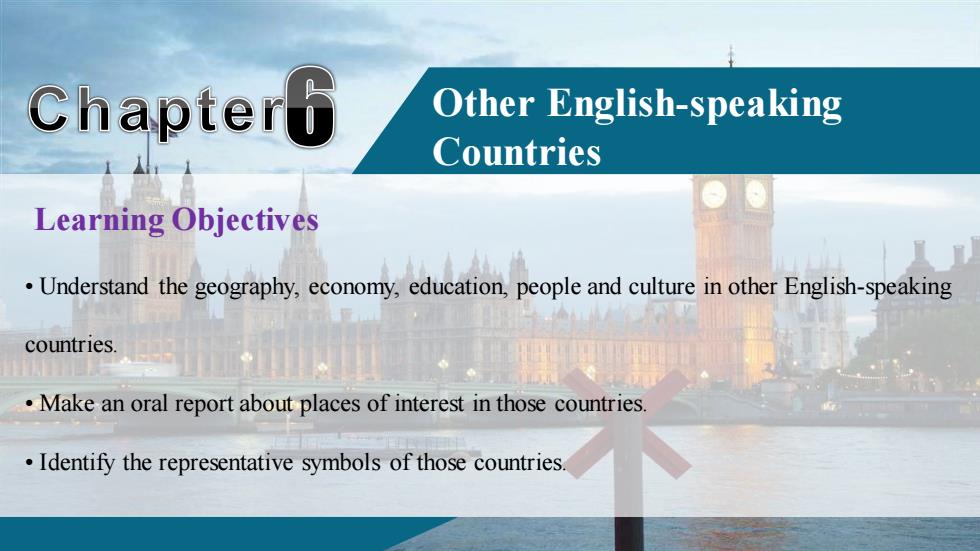
ChapterG Other English-speaking Countries Learning Objectives Understand the geography,economy,education,people and culture in other English-speaking countries. Make an oral report about places of interest in those countries. Identify the representative symbols of those countries
Other English-speaking Countries • Understand the geography, economy, education, people and culture in other English-speaking countries. • Make an oral report about places of interest in those countries. • Identify the representative symbols of those countries. Learning Objectives

Section A Exploring the World
Section A Exploring the World
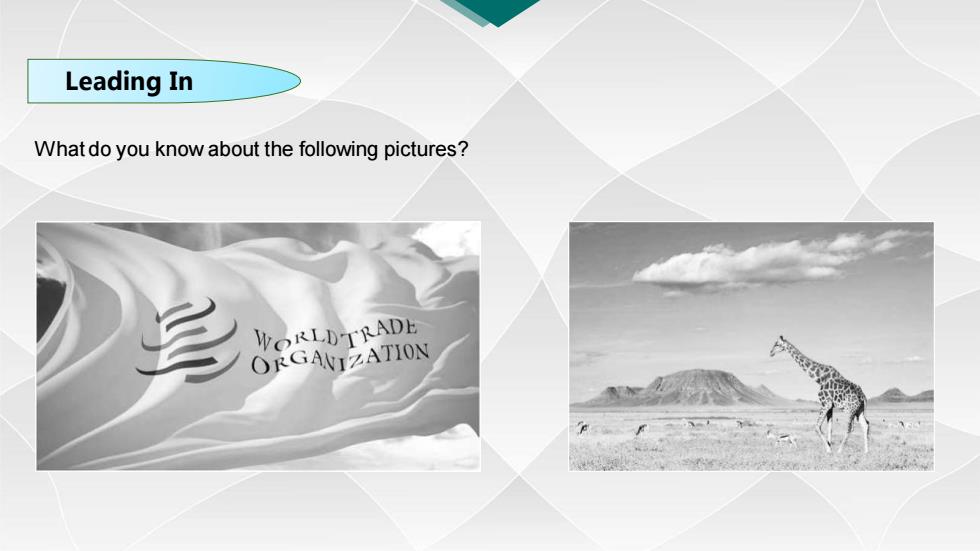
Leading In What do you know about the following pictures? WORLDTRADE ORGANIZATION
Leading In What do you know about the following pictures?
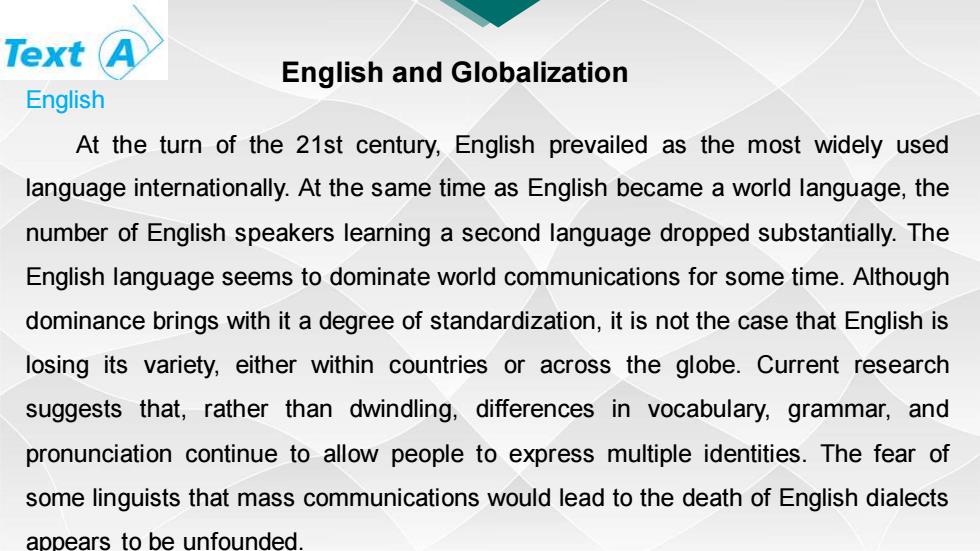
Text English and Globalization English At the turn of the 21st century,English prevailed as the most widely used language internationally.At the same time as English became a world language,the number of English speakers learning a second language dropped substantially.The English language seems to dominate world communications for some time.Although dominance brings with it a degree of standardization,it is not the case that English is losing its variety,either within countries or across the globe.Current research suggests that,rather than dwindling,differences in vocabulary,grammar,and pronunciation continue to allow people to express multiple identities.The fear of some linguists that mass communications would lead to the death of English dialects appears to be unfounded
English and Globalization English At the turn of the 21st century, English prevailed as the most widely used language internationally. At the same time as English became a world language, the number of English speakers learning a second language dropped substantially. The English language seems to dominate world communications for some time. Although dominance brings with it a degree of standardization, it is not the case that English is losing its variety, either within countries or across the globe. Current research suggests that, rather than dwindling, differences in vocabulary, grammar, and pronunciation continue to allow people to express multiple identities. The fear of some linguists that mass communications would lead to the death of English dialects appears to be unfounded
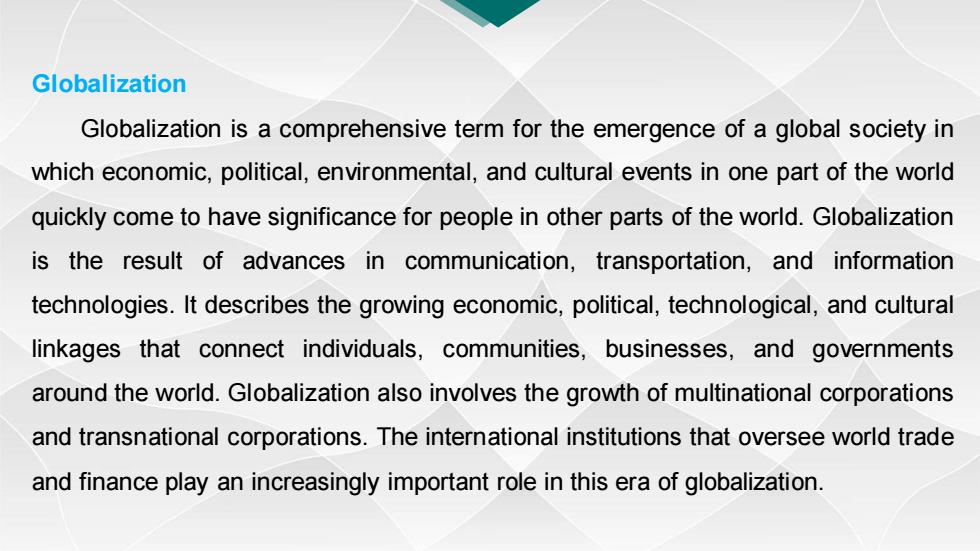
Globalization Globalization is a comprehensive term for the emergence of a global society in which economic,political,environmental,and cultural events in one part of the world quickly come to have significance for people in other parts of the world.Globalization is the result of advances in communication,transportation,and information technologies.It describes the growing economic,political,technological,and cultural linkages that connect individuals,communities,businesses,and governments around the world.Globalization also involves the growth of multinational corporations and transnational corporations.The international institutions that oversee world trade and finance play an increasingly important role in this era of globalization
Globalization Globalization is a comprehensive term for the emergence of a global society in which economic, political, environmental, and cultural events in one part of the world quickly come to have significance for people in other parts of the world. Globalization is the result of advances in communication, transportation, and information technologies. It describes the growing economic, political, technological, and cultural linkages that connect individuals, communities, businesses, and governments around the world. Globalization also involves the growth of multinational corporations and transnational corporations. The international institutions that oversee world trade and finance play an increasingly important role in this era of globalization
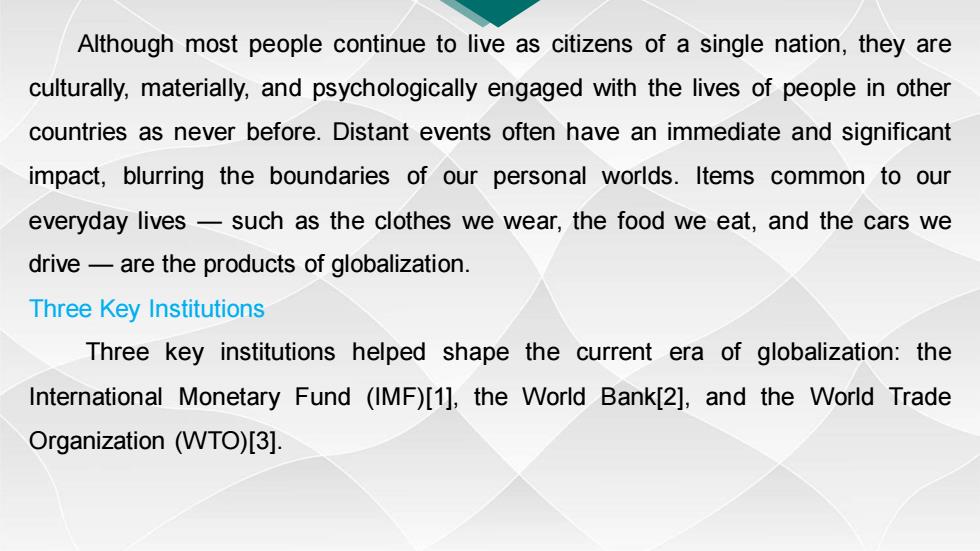
Although most people continue to live as citizens of a single nation,they are culturally,materially,and psychologically engaged with the lives of people in other countries as never before.Distant events often have an immediate and significant impact,blurring the boundaries of our personal worlds.Items common to our everyday lives-such as the clothes we wear,the food we eat,and the cars we drive-are the products of globalization. Three Key Institutions Three key institutions helped shape the current era of globalization:the International Monetary Fund (IMF)[1],the World Bank[2],and the World Trade Organization (WTO)[3]
Although most people continue to live as citizens of a single nation, they are culturally, materially, and psychologically engaged with the lives of people in other countries as never before. Distant events often have an immediate and significant impact, blurring the boundaries of our personal worlds. Items common to our everyday lives — such as the clothes we wear, the food we eat, and the cars we drive — are the products of globalization. Three Key Institutions Three key institutions helped shape the current era of globalization: the International Monetary Fund (IMF)[1], the World Bank[2], and the World Trade Organization (WTO)[3]
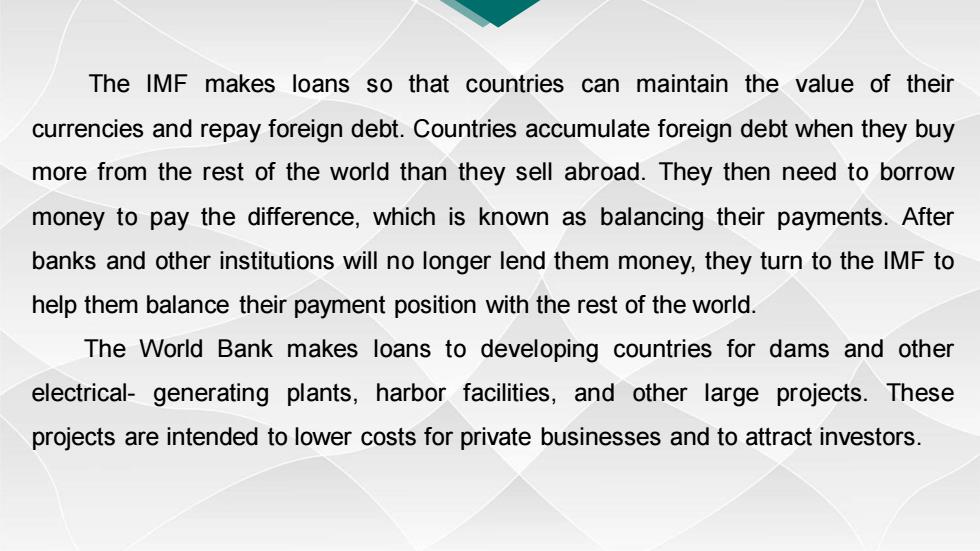
The IMF makes loans so that countries can maintain the value of their currencies and repay foreign debt.Countries accumulate foreign debt when they buy more from the rest of the world than they sell abroad.They then need to borrow money to pay the difference,which is known as balancing their payments.After banks and other institutions will no longer lend them money,they turn to the IMF to help them balance their payment position with the rest of the world. The World Bank makes loans to developing countries for dams and other electrical-generating plants,harbor facilities,and other large projects.These projects are intended to lower costs for private businesses and to attract investors
The IMF makes loans so that countries can maintain the value of their currencies and repay foreign debt. Countries accumulate foreign debt when they buy more from the rest of the world than they sell abroad. They then need to borrow money to pay the difference, which is known as balancing their payments. After banks and other institutions will no longer lend them money, they turn to the IMF to help them balance their payment position with the rest of the world. The World Bank makes loans to developing countries for dams and other electrical- generating plants, harbor facilities, and other large projects. These projects are intended to lower costs for private businesses and to attract investors
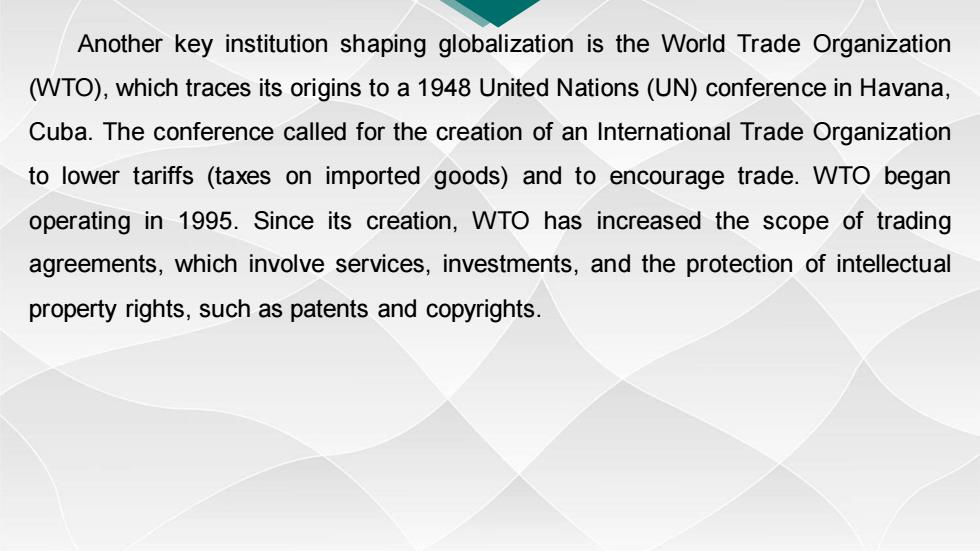
Another key institution shaping globalization is the World Trade Organization (WTO),which traces its origins to a 1948 United Nations(UN)conference in Havana, Cuba.The conference called for the creation of an International Trade Organization to lower tariffs (taxes on imported goods)and to encourage trade.WTO began operating in 1995.Since its creation,WTO has increased the scope of trading agreements,which involve services,investments,and the protection of intellectual property rights,such as patents and copyrights
Another key institution shaping globalization is the World Trade Organization (WTO), which traces its origins to a 1948 United Nations (UN) conference in Havana, Cuba. The conference called for the creation of an International Trade Organization to lower tariffs (taxes on imported goods) and to encourage trade. WTO began operating in 1995. Since its creation, WTO has increased the scope of trading agreements, which involve services, investments, and the protection of intellectual property rights, such as patents and copyrights

Notes International Monetary Fund(IMF):国际货币基金组织。IMF是政府间国 际金融组织,总部设在华盛顿。该组织的资金来源于各成员认缴的份颜。 成员享有提款权,即按所缴份额的一定比例借用外汇。成员有义务提供经 济资料,并在外汇政策和管理方面接受该组织的监督。 2. the World Bank:世界银行。世界银行集团的简称,“世界银行”这个名称一 直用于指国际复兴开发银行(IBRD)和国际开发协会(IDA)。这些机构联合 向发展中国家提供低息贷款、无息信贷和赠款。各机构在减轻贫困和提高 生活水平的使命中发挥独特的作用。 3. World Trade Organization(WTo):世界贸易组织。简称世贸组织,它是一个 独立于联合国的永久性国际组织,负责管理世界经济和贸易秩序,总部设在 瑞士日内瓦莱蒙湖畔
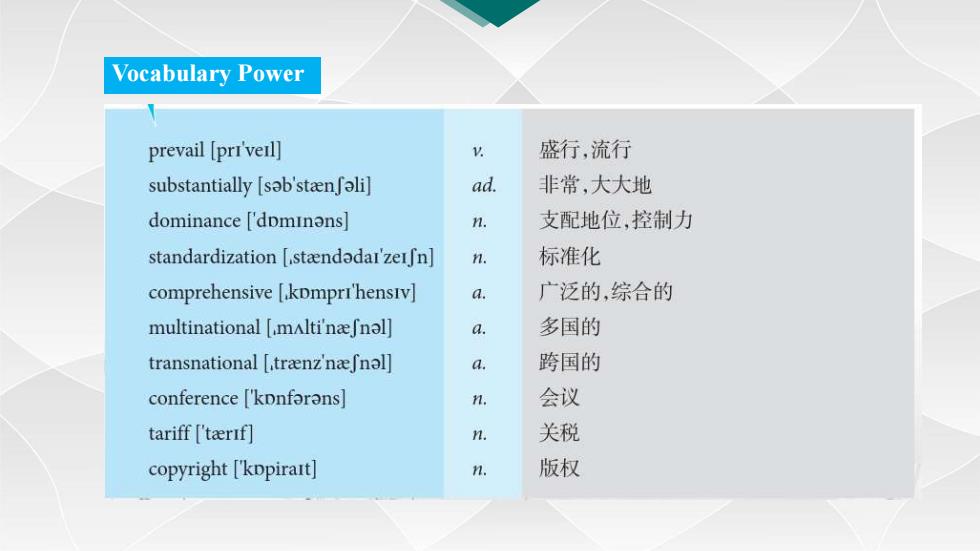
Vocabulary Power prevail [prr'verl] 盛行,流行 substantially [sab'staenfali] ad. 非常,大大地 dominance ['dpminans] 1. 支配地位,控制力 standardization [.staendadal'zeIfn] n. 标准化 comprehensive [.kDmprt'hensIv] a. 广泛的,综合的 multinational [.mAlti'naefnal] 多国的 transnational [.traenz'naefnal] a. 跨国的 conference ['kDnfarans] n. 会议 tariff ['taerif] n. 关税 copyright [kDpirart] n. 版权
Vocabulary Power